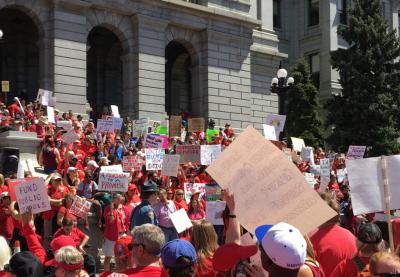May 3, 2018
Denver, Colorado
Dear future educator,
If you’re currently a Colorado student who is wondering why school districts across our state canceled classes for Thursday or Friday this past week, please know that your teachers, lunchroom workers and bus drivers, your counselors, your office staff and all the other education professionals in your school love you and care about your education. More than 10,000 of us, alongside parents, community members and students, participated in last week’s actions because we love our public schools and know the great potential they have to help our democracy move forward.
For those of you who are considering being an educator of any kind, I want to share a heartfelt message with you. Teaching is something I feel privileged to do every day. Each morning, I walk into a beautiful old building and spend time planning lessons, facilitating discussions among students and other teachers, reading essays, conferencing with students, and doing a countless number of other tasks both large and small. Each afternoon I leave exhausted yet filled with a sense that my work has meaning to our world’s present and future.
However, Colorado’s students—and millions more across the country—currently attend schools that are massively underfunded, that lack safe facilities, and that can have great difficulty in recruiting and retaining excellent educators because of low pay. Colorado students deserve so much more than they are currently getting from our state’s policymakers. Students deserve to be able to imagine themselves as future educators in their communities. Students who are interested in teaching, counseling or any other education profession should not have to forgo their dream job for financial reasons.
In some ways, being a teacher is a privilege for me. I am fortunate that I can pay my bills with the salaries that my husband and I earn. Unfortunately, this is not the case for everyone who works in education. Many educators work a second job in order to make ends meet. This is not what Colorado’s students deserve.
Last Thursday and Friday, Colorado educators, parents, students and community members walked out to draw attention to our underfunded public schools. We traveled from near and far to our state’s capital to come together with other Coloradans who love public schools, to ensure that all students who want to become educators can see that as a real possibility.
Being an educator is a labor of love, but it is also a profession. Of course we care about student outcomes, but we know our students also deserve safe, clean school buildings, updated curriculum and materials, and education professionals who are compensated with adequate, competitive salaries. Often, politicians and others portray educators as kind-hearted people who “don’t do it for the money.” While it’s true that most educators aren’t in it for the paycheck, being an educator is a profession—not an act of charity—and last week’s actions are one major step on the road to reinforcing this idea in the public discourse.
As a high school social studies teacher, I feel a particular responsibility to provide students with the information and skills they need to not only succeed in their academic work but also to better understand and participate in the world around them. As educator walkouts, strikes and other actions in support of funding public schools have made national news again and again over the past few months, it’s important for you—current public school students and college students—to understand why these events are happening and to form your own opinions about them.
Public education is the one institution that accepts all students without considering income, race, family background, language, gender or any other identity marker. As Coloradans and participants in a democratic society, it’s up to us—all of us, not just educators—to ensure quality schools for current students and continued progress for future educators and students.
Love,
A Colorado Teacher
Breden is a high school social studies teacher in Denver, Colorado. She is also a member of the Teaching Tolerance Advisory Board.


0 COMMENTS